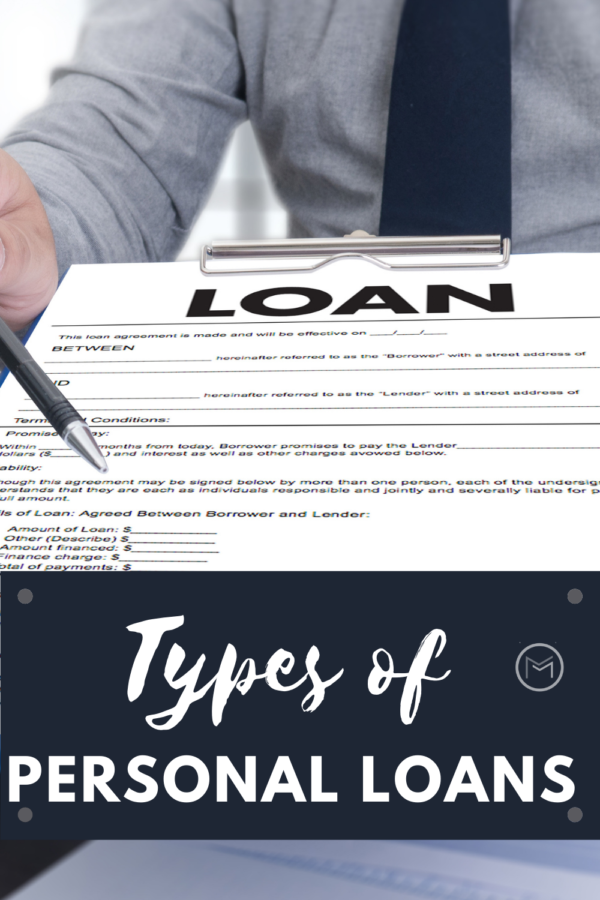Today, I’m sharing financial tips on the types of personal loans for individuals. Have you considered applying for a personal loan? This type of decision is generally made by individuals or families who need to consolidate debt, cover unexpected expenses, make large purchases, or pay for home repairs.
Whatever the reason, borrowing a specific sum of money can help you handle the situation without feeling financial stress. There are various types of personal loans, depending on one’s financial situation, such as unsecured, secured, cosigned, and a personal line of credit. The interest rates and repayment periods are determined by the level of risk lenders take. If shopping for a personal loan, learn more about the most popular types.

Types of Personal Loans:
Unsecured
A large number of borrowers opt for unsecured personal loans since lenders require no collateral. Furthermore, there’s no physical asset to back up the money you’ve borrowed. So, lenders have no power to take any of your assets in the event of failing to pay the installments. The credit history of the borrowers and co-signers is what usually serves as a backup.
Moreover, individuals shopping for an unsecured personal loan need a minimum credit score of a 670 to 739 points or higher. The amount of the loan will depend on the credit score, ranging between $1,000 and $50,000. The better your score, the higher the amount you can borrow. The repayment period is generally between one and six years.
In terms of the interest rates, unsecured loans typically come with high interest. Despite the absence of collateral, individuals might face serious consequences when being late with the payments. For example, late payments could wreck their credit scores.
Secured
Secured personal loans are the complete opposite of the unsecured loan. For example, you must have collateral for a secured loan. The collateral usually takes the form of a vehicle, deposit certificate, savings account, or other types of assets. In case the borrower fails to repay the loan, the lender has the right to seize his/her asset to cover the debt. See this website to check out how secured loans work.
Nevertheless, the interest rates are much lower because of the higher level of security. Consequently, the majority of lenders show greater flexibility when it comes to credit score requirements. The collateral serves as some sort of compensation for not having a solid score. This alternative is considered the best for individuals with a mediocre or poor score.

Cosigned
If you have a cosigner, you can obtain an unsecured or secured loan. In the event of a poor score or non-existent credit history, lenders tend to ask borrowers to have a cosigner whose credit score is significantly higher than yours. The responsibility of the cosigner would be to pay off the debt in case you default.
Instead of collateral, you’ll have a person serving as backup. This scenario will help you get approval as well as more favorable terms. While borrowers stand to gain from such an agreement, cosigners take the risk of experiencing disadvantages.
For instance, the loan will appear on the credit report of the cosigner along with any late payments, which have a negative effect on the score. Therefore, every borrower considering such an option should factor in the financial risk involved in the decision. Any wrong move on your end could mean a damaged personal relationship with the cosigner. The following link, explains what cosigners are liable and responsible for.
Debt consolidation
A debt consolidation loan is a perfect option for individuals having multiple debts. It’s a chance for borrowers to combine all their debts into a single loan so they will just have one monthly payment. This offer is convenient for individuals who wish to reduce their monthly expenses by avoiding multiple interest rates and hefty late fees.
Furthermore, you will only pay one interest rates. However, have to be in control of your debt for this solution to be successful. You should refrain from applying for new personal loans until you pay off the consolidated debt.
Personal line of credit
This type of loan is similar to having a credit card; only the borrowed sum isn’t repaid in monthly installments. Borrowers are provided with access to a given amount of money, which means they can borrow from it whenever necessary. Interest is charged only on the balance that remains.
This option is believed to be the best choice in times of emergency when individuals have to cover unplanned expenses. In order to be considered eligible, you should have a remarkable credit score and credit history.
Make sure you choose the right type so as to avoid unplanned scenarios in the future. Consult a professional if necessary to help you with any decisions!




